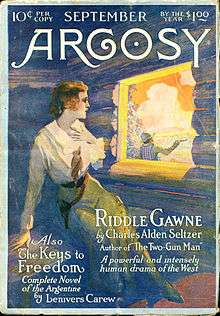Charles Alden Seltzer
Charles Alden Seltzer (August 15, 1875 – February 9, 1942) was an American writer. He was a prolific author of western novels, had writing credits for more than a dozen film titles, and authored numerous stories published in magazines, most prominently in Argosy.[1]
Charles Alden Seltzer | |
|---|---|
| Born | August 15, 1875 Janesville, Wisconsin |
| Died | February 9, 1942 (aged 66) Cleveland, Ohio |
| Resting place | Sunset Memorial Park, North Olmsted, Ohio |
| Occupation | Writer |
| Nationality | American |
| Genre | Western novels, screenplays |

Life
Seltzer was born in Janesville, Wisconsin, the son of Lucien B. Seltzer and Oceania Hart of Columbus, Ohio. Before becoming a successful writer, he was variously a newsboy, telegraph messenger, painter, carpenter and manager of the circulation of a newspaper, building inspector, editor of a small newspaper, and an appraiser.
He married Ella Seltzer, and they had three sons and two daughters. His son, Louis B. Seltzer, later editor of the Cleveland Press, recalled that the family was quite poor when his father was struggling to break into the writing profession (he wrote two hundred stories before receiving an acceptance). During this time, Seltzer's wife brought him wrapping paper from the butcher to write on.[2]
In addition to Argosy, Seltzer's work also appeared in Adventure, Short Stories, Blue Book, The Outing Magazine, Western Story Magazine [3] and the US edition of Pearson's Magazine. [4]
Seltzer wrote his westerns from the experience of five years living in New Mexico. Towards the end of his life, he was also elected mayor of North Olmsted, Ohio, a Cleveland suburb, from 1930 to 1935.[5]
Works
- The Council of Three (1900) – first book
- The Range Riders (1911)
- The Two-Gun Man (1911)
- The Triangle Cupid (1912)
- The Coming of the Law (1912)
- The Boss of the Lazy Y (1915)
- The Range Boss (1916)
- The Vengeance of Jefferson Gawne (1917)
- “Firebrand” Trevison (1918)
- The Ranchman (1919)
- The Trail to Yesterday (1919)
- The Trail Horde (1920)
- Beau Rand (1921)
- “Drag” Harlan (1921)
- West! (1922)
- The Way of the Buffalo (1924)
- Last Hope Ranch (1925)
- Trailing Back (1925)
- Channing Comes Through (1925)
- "Slow" Burgess (1926)
- Land of the Free (1927)
- The Mesa (1928)
- Mystery Range (1928)
- Brass commandments (1928)
- The Valley of the Stars (1928)
- The Gentleman from Virginia (1928)
- The Red Brand (1929)
- The Raider (1929)
- Gone North (1930)
- A Son of Arizona (1931)
- Double Cross Ranch (1932)
- War On Wishbone Range (1932)
- Lonesome Ranch (1933)
- Clear the Trail (1933)
- West of Apache Pass (1934)
- Silver Spurs (1935)
- Kingdom in the Cactus (1936)
- Parade of the Empty Boots (1937)
- Treasure Ranch (1940)
- Arizona Jim (1942)
- So Long, Sucker (1943)
References
- "Charles Alden Seltzer: the Men who make The Argosy". Pulp Rack. Archived from the original on January 10, 2005. Retrieved April 5, 2011. reprinting March 22, 1930 profile in The Argosy.
- "Crusading Seltzer was Compassionate Dynamo". lakewoodhistory.org. Lakewood Sun Post. April 20, 1989. Retrieved December 22, 2016.
- Ed Hulse, The Blood 'n' Thunder Guide to Collecting Pulps . Murania Press, 2009. ISBN 0-9795955-0-9 (pp. 137-141 )
- Charles Alden Seltzer Archived November 29, 2011, at the Wayback Machine at the Fictionmags Index.
- "Charles Alden Seltzer House" (PDF). North Olmsted. Cite journal requires
|journal=(help)
External links
- Works by Charles Alden Seltzer at Project Gutenberg
- Works by Charles Alden Seltzer at LibriVox (public domain audiobooks)

- Works by Charles Alden Seltzer at Faded Page (Canada)
- Works by or about Charles Alden Seltzer at Internet Archive
- Charles Alden Seltzer holdings at openlibrary.org
- Charles Alden Seltzer on IMDb
- "Charles Alden Seltzer". Find a Grave. October 22, 2008. Retrieved April 5, 2011.